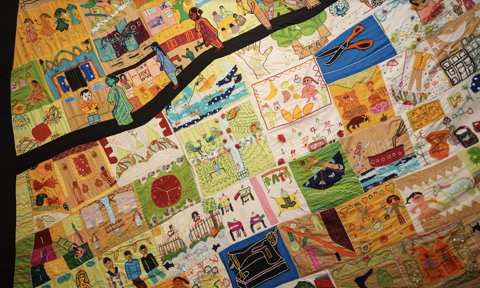
Contemporary art has always been a powerful cultural tool that reflects larger contextual frameworks in a society — be it identity, community or family. South Asian contemporary art gradually took shape over the past couple of decades, especially in India, and is now populated with a robust network of galleries and institutions that have helped in its commercialisation. But during this ascent, there was a prominent gap between art that was gentrified — for the lack of a better word— and a space where new and innovative practices could thrive.
This prompted a group of like-minded people from the art fraternity to come together and create a safe space for artists to bring their art to life. This space came to be known as Khoj, which translates to ‘search’ — exactly what it’s been seeking to practice since its inception in 1997.
“Seven of us, including Subodh Gupta, Bharti Kher, Ajay Desai, PS Ladi, Anita Dube and Manisha Parekh, started Khoj in 1997. It was a space for experimentation and exchange,” says Pooja Sood, one of the seven founding members and current Director of Khoj International Artists’ Association. “At that time, the artscape was quite conservative. Galleries were few in number and not many artists travelled abroad. So to have a space where artists could do things outside of an institutional framework, be it at a gallery or at a college, was important.”
A B.Sc graduate with an MBA from Symbiosis University, Pune, Sood’s art-origin story is as unconventional as it comes. A move to Chandigarh led her to discover an art history course at Panjab University, which sparked something in her. The rest, as they say, is history. Next, a formative stint with Delhi’s Eicher Gallery opened her eyes to the chasm between what the Indian contemporary art scene was at the moment and what it could be with the right kind of resources and support.
“Initially, we ran Khoj for two years from my house, before moving to a small space in South Ex (Delhi) and eventually to the space we’re at right now,” says Sood. “We started residency programmes and workshops all over India, from Srinagar to Goa, and engaged with local artists. We trained them in ways to fundraise; we shared our artists and funding networks. We wanted to energise local arts across the country.”
With Sood at the helm, Khoj evolved into an alternative incubation space for artists looking to experiment with interdisciplinary practices in the contemporary genre. But the biggest roadblock in its path — and in the trajectory of Indian contemporary arts — was the lack of financial aid.
“The ecosystem is not really robust,” she says. “We have some fantastic galleries, but all in the private sector. Galleries and auction houses have been steering the industry, and we’re seeing more saleable art. We need spaces like Khoj and other not-for-profit areas that will support experimental works. Where artists can paint because they just want to paint, not because they want their art to sell. Philanthropy for culture is so nascent in our country.”
Sood, however, acknowledges that art in India is much better off than its contemporaries across South Asia, with many countries in the subcontinent in social and economic distress. “If it’s fragile here, then imagine how fragile it is in parts of South Asia that are not doing well economically,” stresses Sood, who, in spite of the state of affairs, remains optimistic about the future of the industry here. “The exciting part is that despite all odds, artists are doing some very socially aware, exciting work. There’s a whole bunch of young talent across South Asia that’s coming up with new practices.”
Khoj’s future, she concludes, lies in encouraging this up-and-coming lot of artists and reaching out with a helping hand to the nascent art scenes across these countries.
This has been adapted for the web from a story originally published in the March 2023 issue of HELLO! India. Get our copy of the latest issue right here!
- Quick links
- Pooja Sood
- Khoj
- Art






